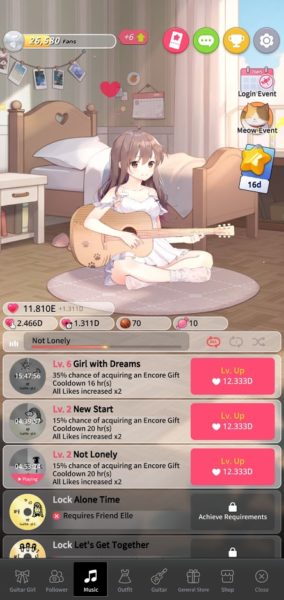The gentle Zen of Guitar Girl
I’ll level with you, dear reader; idle and clicker games kind of baffle me a bit. After all, the genre was popularised by 2010’s Cow Clicker, a game intended as satirical commentary on the vapid nature of many mobile and social games at the time, and not as something that people should take too seriously. But over the last decade, we’ve seen developers put out some interesting experiments with this inherently passive sort of experience — with a particularly striking one being Neowiz’s Guitar Girl, launched globally in November of last year.
In Guitar Girl, we’re introduced to the titular, nameless heroine as someone who doesn’t interact with others much, instead preferring to stay at home and play the guitar. Her friend Joy, who is very supportive of Guitar Girl’s talents, suggests that she should make use of social media as a means of building up her confidence, perhaps with the long-term goal of one day performing in front of people in person.

Gameplay-wise, Guitar Girl unfolds much like every other clicker game out there. You can tap on the screen to earn “Likes” for Guitar Girl, which can be spent to level her up, which in turn provides you with more Likes per tap. And as the game progresses, you can unlock “Followers” for her, who allow her to passively earn Likes without you having to tap the screen — or indeed even have the app open. Said followers can also be levelled up, gradually increasing the rate at which Guitar Girl acquires Likes. (You can also spend real money on the game for various benefits — though one might argue doing so in order to progress faster is missing the point somewhat.)
There are other things to unlock, too — clothing items and furniture for Guitar Girl’s room provide passive bonuses, different pieces of music for Guitar Girl to perform provide opportunities for random bonuses at fixed intervals and skills with cooldowns allow for temporary increases to the rate at which she acquires Likes — but for the most part, this is simply a game about watching numbers go up. You can’t do badly at Guitar Girl and you can’t fail; the worst you can do is spend some of Guitar Girl’s Likes on something that isn’t especially helpful at that exact moment, and even then, correcting said “mistake” is a simple matter of building up those Likes again.
Guitar Girl isn’t a game to play for its mechanical aspects, though. Instead, the most interesting thing about it is how it tells its story. As you help Guitar Girl gradually increase in popularity, she’ll receive text messages, initially just from her friend Joy but subsequently from the additional Followers you help her obtain. Each Follower has their own little narrative thread to follow, delivered entirely through text message; various things are implied to happen “off-camera”, but we only ever see the reactions from the character in question and Guitar Girl via text and the occasional picture message.

It’s an interesting, subtle means of storytelling that works well within the context of the game — particularly because the fact you’re playing it on your phone provides a diegetic element to the interface. When you’re reading those text messages and looking at those images, you’re seeing exactly what Guitar Girl sees and getting a chance to feel what she’s feeling at the time. The game even replaces your phone’s lock screen while it’s running, showing player controls for whatever Guitar Girl is currently playing and providing It’s quite heartwarming to see her gradually getting to know the people around her and come to the realisation that interacting with others doesn’t have to be scary; her music is something that brings people together, and even provides comfort during times of sadness.

Pleasingly, the game’s monetisation isn’t obnoxious. While there are a few things you can spend money on — including the seemingly now-obligatory “premium pass” model, where you pay up front on a semi-regular basis for the opportunity to unlock a series of exclusive rewards — there’s absolutely no need to spend money on the game unless you just want to support its development. You have the option to watch ads in order to obtain various benefits such as reducing cooldown times, too — but these are never forced on you, and they tend to show things that might actually be of interest to someone who is playing Guitar Girl, which is nice. On top of that, despite the game’s thematic content, there is absolutely no real-life social element either — no bugging your friends for additional Likes or helping you out in PvP here!
Guitar Girl isn’t going to go down in history as a great masterpiece of gaming or anything like that, but it is a nice little game to have running by your side during the working day or while you don’t have anything better to do. Guitar Girl’s relaxing tunes provide a lovely, comfortable atmosphere in which to get things done, and the occasional narrative elements keep things interesting and engaging in the long-term. After a bit of time playing, it’s hard not to feel attached to Guitar Girl and the gradual process of building up her confidence — and the various stories she shares with her friends.
Guitar Girl is available now as a free download for Android devices via Google Play, and iOS devices via the App Store.
Join The Discussion
Rice Digital Discord
Rice Digital Twitter
Rice Digital Facebook
Or write us a letter for the Rice Digital Friday Letters Page by clicking here!
Disclosure: Some links in this article may be affiliate links, which means we may earn a small commission if you make a purchase after clicking on them. This is at no additional cost to you and helps support Rice Digital!
- Letter from the Editor: passing the torch - June 30, 2023
- Super Woden GP 2 is looking promising - June 30, 2023
- Inti Creates is making a 32 bit-style Love Live action platformer - June 26, 2023






